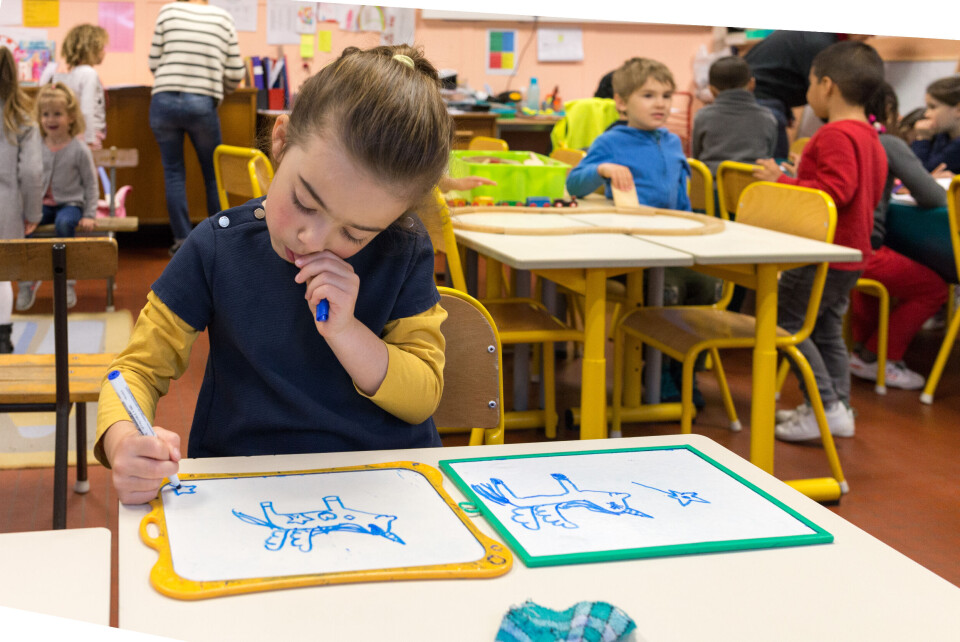-
Cold Christmas in France, but little chance of snow
High-pressure system will move into France from north-east at the start of next week
-
British ‘Puppet Master’ conman in French jail wins phones back on appeal
Robert Hendy-Freegard was given a six-year sentence after hitting two gendarmes with his car
-
Alleged British hacker in jail in France offers to help with police data breach
Recent attack targeted police files
What’s new for pupils as schools restart in France
Changes to primary and secondary education as well as to the Bac exam have been announced

A new school year begins today in France and brings several changes for pupils of all ages. We summarise the key measures.
One of the main changes involves a greater emphasis on reading, writing and maths for primary school pupils as part of a range of new measures intended to ease their entry into secondary school.
The new Minister of Education, Gabriel Attal, outlined his vision to address the shortcomings of the school system in a press conference last week following his announcement of the ban on abayas.
Read more: Abaya dress worn by some Muslim girls is banned from schools in France
The new measures, intended to “place the emphasis on the foundations of knowledge” come after a government report suggests that more than a quarter (27%) of pupils do not have the required level of French or maths when they reach secondary school.

Caption: The new Ministry of Education Gabriel Attal has rung the changes in the past week
He also noted that moving from primary schools where schools are run by the local mairie to secondary schools run by the department can be “brutal” and has introduced several measures to ease this transition.
What changes has Mr Attal announced?
More reading from age six: Two hours of reading each day from the first year in primary school (class CP).
New tests from the age of nine: Nine-year-olds going into their fourth year of primary school (class CM1) who are still struggling to read "will benefit from even more daily reading, which should include longer texts".
Pupils in CM1 will also face new French and maths exams "so that from the start of the school year we can objectively identify the areas with which they struggle".
More writing from age ten: Ten-year-olds (class CM2) will have to "produce at last one written text each week".
Entry into secondary school: There is to be more private tutoring and more pastoral support from teachers to ease the transition from primary to secondary school (collège).
Secondary school pupils will also be exposed to more cultural activities and two hours of sport each week.
In their first year of secondary school, usually at age 12, pupils will have to read at “least two long texts” each week, with more emphasis on comprehension and spoken expression.
Secondary school pupils will also have time allotted to do their homework at school in supervised work spaces.
Changes to the baccalauréat exams
Students will sit the bac exams (A-level equivalent) for selective subjects in June, at around the same time as other subjects. Previously, exams for selective subjects could come as early as March, which a teachers union said contributed to a “disruptive absenteeism”.
The Snes-FSU teaching union welcomed this change, calling it “very good news for teachers and students.”
There will also be less emphasis placed on the much dreaded grand oral, in which students are evaluated on their speaking and presentation skills by a jury of teachers. Students will now have only 16 texts to study rather than 20 as was previously the case.
However, maths is to be reinstated as a mandatory subject for students doing the bac général. Maths was made a selective subject in 2019.
The minister also announced that students doing a vocational bac will be paid up to €100 per week for the work they do for companies. Previously, students were not paid during their work placements, or stages.
Why these changes?
The Education Nationale has been particularly concerned by the performance of primary schools for some years after an international report in 2019 by TIMSS, the Trends in Mathematics and Science Study that monitors global trends in school achievement, found that France performed poorly in all subjects at primary level. It was also found to be the worst performing European country in maths for pupils aged nine to ten.
The same report found that the UK outperformed all European countries in maths, behind only South Korea and Japan for pupils aged nine to ten.
Related articles:
La rentrée: 12 points to understand French schools
Why bic pens pose a problem to teachers in France as schools restart
























